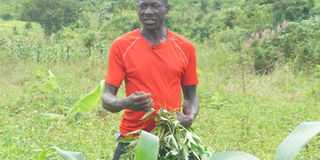Adomati taking the organic route

Adomati tends to his crops on the farm during a tour. PHOTO BY PHIONA NASSANGA
When he graduated with a diploma in constructional engineering Adomati thought life would be easy, not knowing that he would have to work hard to live a happy life. Before he despised farmers thinking they never earned anything but today he is one of the farmers in Mpigi District earning from his organic farming.
Adomati grows sweet potatoes, matooke, and vanilla as well as rearing pigs. This has really changed his life. Adomati started in 2016 when his brother called him from Lira to attend a training in organic farming which was organised by Songhai Integrated Model farm Kampiringisa, Mpigi.
The Songhai model
Songhai is a farming model launched by President Museveni on August 12, 2018, as part of the activities to celebrate the Youth Day in Kampiringisa, Mpigi District.
The model is a part of the agricultural revolution that deploys a new paradigm that harnesses the environmental capital to produce more and better quality food while protecting and enhancing the environment.
The Songhai model has regenerative capability that promotes a real “greening” of agriculture, through an ecosystem approach that draws nature’s contributions to crop and animal growth, such as soil organic matter and soil micro-organisms, rainfall, pollination and bio-control and integrated pest management, eco services (water shades and landscapes).
The training site in Kampiringisa is manned by seven Ugandans who were trained in the Songhai Centre in Benin in 2017.
This model was established by Prof Fr Godfrey Nzamujo, a Dominican Republic priest who currently exports organic agricultural products to the US. The idea is to have food crops including, cassava, tomatoes, cucumbers, egg plants, cabbages, carrots, French beans, and paw paws, among others. The desired farms should also have poultry, piggery, fish ponds, banana plantations and agroforestry.
The different crops are grown in sub-plots of one crop rather than being inter-cropped. The idea is to have different enterprises benefit from each other without having to use chemicals. For instance, animals feed on farm products in the crop and agro-forestry section while animal waste is used as manure in the farm.
“I had never thought of engaging in farming, but when my brother realised I was not doing any better he asked me to travel to Mpigi and get trained in organic farming,” Adomati recalls.
Early days
Building business was not all rosy, recalls Adomati. The seasonal nature made his income unstable because he would only get hired when there was need for a helper at a construction site.
“As a constructor the contracts were seasonal and there were months I would go without any work,” he says. After training for eight months in organic farming practices at Kampiringisa, Adomati discovered that organic farming was not only a superior approach to crop growing, but also a cheap practice as a farmer does not have to spend on pesticides and fertilisers which could be made locally using organic material. He was trained on the maximum use of small pieces of land for different agricultural enterprises and how they can be beneficial to each other without putting anything to waste.
“The model taught me to produce more with fewer expenses, thus transforming my economy and lifestyle.
From his uncle’s piece of land (100 by 50 ft) in Mpigi District, the 27-year-old decided to start with two piglets which he bought at Shs100,000. In a period of eight months these had multiplied to more than 10 pigs.
These were later sold off at about one and half months at Shs50,000 each. He states that the money from his sales was used to buy 200 suckers of matooke. He intercropped the bananas with 60 stems of vanilla as well as sweet potatoes.
On the same land Adomati continues to rear the local pigs and currently he owns 15 piglets which he is looking forward to sell and invest the money in poultry keeping. Adomati states that globally, people are increasingly becoming mindful about their health, which has given organic foods a high demand. He says organic food is priced higher than food grown with the use of chemicals.
“Other than being employed at the Songhai demonstration farm, I earn about Shs700,000 from my farm,” he reveals. He mentions that organic farming has also set him apart from the rest of the farmers in the area “Training from Songhai has given me the privilege to train other farmers as well.”
Today Adomati has made organic farming his mission. “I keep experimenting with various crops in my field and stand by the fact that organic farming is gaining popularity. More people are moving towards growing and consuming organic food,” he explains.
Marketing
Besides training farmers on the basic organic farming practices, Adomati says that the Songhai model helps them in the export market.
“Sometimes I sell my produce to the residents or take them to Mpigi trading centre for market vendors but we have a ready international market too.”
He adds that though organic farming is so demanding and not easy to sustain, it is worth the effort since it ensures safety for the farmer, consumer and the environment while giving high yields and proceeds.
Future plans
Today Adomati has one employee but he has plans to buy more land and expand his projects. He is also looking forward to engaging in poultry and expanding his piggery project which will call for more employees.
Challenges Adomati’s biggest challenge is that organic farming requires a lot of patience, especially when rearing animals.




